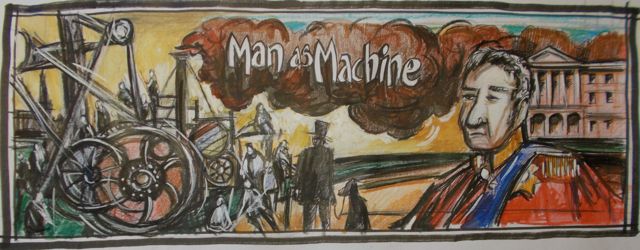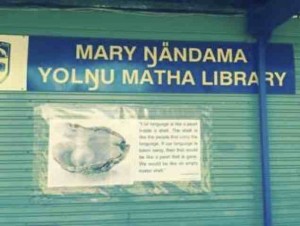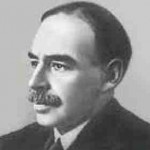The curfew tolls the knell of parting day,
The lowing herd wind slowly o’er the lea,
The plowman homeward plods his weary way,
And leaves the world to darkness and to me.
Now fades the glimm’ring landscape on the sight,
And all the air a solemn stillness holds,
Save where the beetle wheels his droning flight,
And drowsy tinklings lull the distant folds;
Save that from yonder ivy-mantled tow’r
The moping owl does to the moon complain
Of such, as wand’ring near her secret bow’r,
Molest her ancient solitary reign.
Beneath those rugged elms, that yew-tree’s shade,
Where heaves the turf in many a mould’ring heap,
Each in his narrow cell for ever laid,
The rude forefathers of the hamlet sleep.
The breezy call of incense-breathing Morn,
The swallow twitt’ring from the straw-built shed,
The cock’s shrill clarion, or the echoing horn,
No more shall rouse them from their lowly bed.
For them no more the blazing hearth shall burn,
Or busy housewife ply her evening care:
No children run to lisp their sire’s return,
Or climb his knees the envied kiss to share.
Oft did the harvest to their sickle yield,
Their furrow oft the stubborn glebe has broke;
How jocund did they drive their team afield!
How bow’d the woods beneath their sturdy stroke!
Let not Ambition mock their useful toil,
Their homely joys, and destiny obscure;
Nor Grandeur hear with a disdainful smile
The short and simple annals of the poor.
The boast of heraldry, the pomp of pow’r,
And all that beauty, all that wealth e’er gave,
Awaits alike th’ inevitable hour.
The paths of glory lead but to the grave.
Nor you, ye proud, impute to these the fault,
If Mem’ry o’er their tomb no trophies raise,
Where thro’ the long-drawn aisle and fretted vault
The pealing anthem swells the note of praise.
Can storied urn or animated bust
Back to its mansion call the fleeting breath?
Can Honour’s voice provoke the silent dust,
Or Flatt’ry soothe the dull cold ear of Death?
Perhaps in this neglected spot is laid
Some heart once pregnant with celestial fire;
Hands, that the rod of empire might have sway’d,
Or wak’d to ecstasy the living lyre.
But Knowledge to their eyes her ample page
Rich with the spoils of time did ne’er unroll;
Chill Penury repress’d their noble rage,
And froze the genial current of the soul.
Full many a gem of purest ray serene,
The dark unfathom’d caves of ocean bear:
Full many a flow’r is born to blush unseen,
And waste its sweetness on the desert air.
Some village-Hampden, that with dauntless breast
The little tyrant of his fields withstood;
Some mute inglorious Milton here may rest,
Some Cromwell guiltless of his country’s blood.
Th’ applause of list’ning senates to command,
The threats of pain and ruin to despise,
To scatter plenty o’er a smiling land,
And read their hist’ry in a nation’s eyes,
Their lot forbade: nor circumscrib’d alone
Their growing virtues, but their crimes confin’d;
Forbade to wade through slaughter to a throne,
And shut the gates of mercy on mankind,
The struggling pangs of conscious truth to hide,
To quench the blushes of ingenuous shame,
Or heap the shrine of Luxury and Pride
With incense kindled at the Muse’s flame.
Far from the madding crowd’s ignoble strife,
Their sober wishes never learn’d to stray;
Along the cool sequester’d vale of life
They kept the noiseless tenor of their way.
Yet ev’n these bones from insult to protect,
Some frail memorial still erected nigh,
With uncouth rhymes and shapeless sculpture deck’d,
Implores the passing tribute of a sigh.
Their name, their years, spelt by th’ unletter’d muse,
The place of fame and elegy supply:
And many a holy text around she strews,
That teach the rustic moralist to die.
For who to dumb Forgetfulness a prey,
This pleasing anxious being e’er resign’d,
Left the warm precincts of the cheerful day,
Nor cast one longing, ling’ring look behind?
On some fond breast the parting soul relies,
Some pious drops the closing eye requires;
Ev’n from the tomb the voice of Nature cries,
Ev’n in our ashes live their wonted fires.
For thee, who mindful of th’ unhonour’d Dead
Dost in these lines their artless tale relate;
If chance, by lonely contemplation led,
Some kindred spirit shall inquire thy fate,
Haply some hoary-headed swain may say,
“Oft have we seen him at the peep of dawn
Brushing with hasty steps the dews away
To meet the sun upon the upland lawn.
“There at the foot of yonder nodding beech
That wreathes its old fantastic roots so high,
His listless length at noontide would he stretch,
And pore upon the brook that babbles by.
“Hard by yon wood, now smiling as in scorn,
Mutt’ring his wayward fancies he would rove,
Now drooping, woeful wan, like one forlorn,
Or craz’d with care, or cross’d in hopeless love.
“One morn I miss’d him on the custom’d hill,
Along the heath and near his fav’rite tree;
Another came; nor yet beside the rill,
Nor up the lawn, nor at the wood was he;
“The next with dirges due in sad array
Slow thro’ the church-way path we saw him borne.
Approach and read (for thou canst read) the lay,
Grav’d on the stone beneath yon aged thorn.”
THE EPITAPH
Here rests his head upon the lap of Earth
A youth to Fortune and to Fame unknown.
Fair Science frown’d not on his humble birth,
And Melancholy mark’d him for her own.
Large was his bounty, and his soul sincere,
Heav’n did a recompense as largely send:
He gave to Mis’ry all he had, a tear,
He gain’d from Heav’n (’twas all he wish’d) a friend.
No farther seek his merits to disclose,
Or draw his frailties from their dread abode,
(There they alike in trembling hope repose)
The bosom of his Father and his God.
Comments by Ira Maine, Poetry Editor
Imagine you are busy as a bee, the feet rushed off you, a thousand and one things to do, and no bloody time at all.
In the midst of it all, out of God knows where, there’s this whispered, gentle voice;
‘The curfew tolls the knell of parting day,
The lowing herd winds slowly o’er the lea.
The ploughman homeward plods his weary way
And leaves the world to darkness and to me’.
There’s an astonishing winding down here, a hugely skillful poetic imagination at work which deliberatelyseduces the senses, easing us into an end of the day reverie where we are left with nothing but ourselves.
The solemn quiet of evening descends slowly, disturbed only by a very late beetle’s homeward droning flight, and the sound, in the distance, of sheep bells.
‘…and drowsy tinklings lull the distant folds…’
In the dark, in this quiet, all there is, as night gathers, is the sound of a disgruntled owl, not exactly pleased to have ‘…his solitary reign…’ disturbed by other nocturnals.
The poet sits on in the little graveyard, a little less mindful of the awakening night and curious now about;
‘…the rude forefathers of the hamlet…’, those unsung people, that unsung person;
‘…in his narrow cell forever laid…’
None of them, not one of them, will ever again hear;
‘…the breezy call of incense breathing morn… the swallow twittering…the cock’s shrill clarion…’ the hunter’s horn….
‘For them no more…the busy housewife, the blazing hearth the kids and the welcome home kisses…’
Yet… these people, these dead were great amongst their peers. They knew precisely how to win a harvest, to plough, to drive their teams afield and burst apart ‘…the stubborn glebe… beneath their stubborn stroke…’
They were poor, unsung, miraculous people and deserving of our respect. Never in any sense ambitious, never pursuing the …’ boasts of heraldry, the pomp of power…’ all of the vaunted…’ beauty, all that wealth e’er gave…’
Aware instead that inevitably
‘…paths of glory lead but to the grave…’
Gray suggests that every life, every body in this churchyard is worthwhile. Simply because these dead failed to rise above their lot in life they are not to be ridiculed as hayseeds and idiots.
Court life demands a man be ambitious, be forward, that he make the best of his opportunities. But what the hell is this business of ambition all about?
‘…can storied urn or animated bust,
Back to its mansion call the fleeting breath…’
In other words fame and honour and bloody glory are not worth a cracker in the end. None of it will make a bit of difference when you are dead. Judging yourself by how others view you is a stupidly dangerous business.
Judge yourself by your own standards. Set them for yourself and live by them and then; ‘…thou cans’t be false to no man…’
But in the end it was penury which made decisions for these people. Poverty, grinding, souless poverty, wears down the best of us, and freezes;
‘…the genial current of the soul…’
And then the most quoted…
’full many a flower is born to blush unseen,
And waste its sweetness on the desert air…’
Gray’s sympathies are writ large;
How many Mozarts, Heaneys and Shakespeares have been lost to us through deliberately engineered poverty?
These people, through their circumstances were never afforded the opportunity to;
‘…wade through slaughter to a throne,
And shut the gate of mercy on mankind…’
Ambition, Gray is saying affords no mercy and believes slaughter to be a legitimate tool if its objectives are to be achieved.
Yet, away from all this;
‘…far from the madding crowd’s ignoble strife…
…they kept the noiseless tenor of their way…’
As an aside here, you might remember one of Hardy’s most memorable novels was called ‘Far from the Madding Crowd’ and that one of Ridley Scott’s early movies was ‘Paths of Glory’, all nicked from Thomas Gray.
In the end, even the most obscure people are remembered. Rough calvary’s are constructed and the unlearned peasant knows precisely how to do homage. There is no difference whatever between the death of a king and that of a penniless peasant. Only idiots make a distinction. Nobody wants to die and everybody wants to die surrounded by friends,
‘…on some fond breast the parting soul relies.
Some pious drops the closing eye requires…’ (Extreme Unction perhaps?…)
Gray quietly observes that none of us, not one of us would be here were it not for the poor.
Since time began a level of society has existed to provide the rest of us with time to think, for ambitious ideas… and poetry.
Then Gray rounds the poem off by having some ‘hoary headed swain’ observe that although he has seen Gray many times about the place, walking in the early morn, or sitting and ranting on to himself under a tree, he has not seen him of late about his usual haunts.
Like everybody else, Gray knows Gray will die and, conveniently, before this happens, he provides his own epitaph.
The Epitaph generally says he wasn’t a bad chap, taken for all and all.
He was in fact, quite a bit more than that.
Gray’s poetry caused a sensation at the time and quite changed how poetry was written.
We shall not look upon his like again.
Ira Maine.




